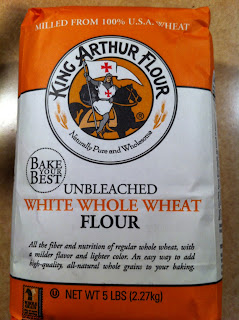A.
You are right; whole wheat white bread sounds like fiction, but it is true. There
is white whole wheat flour available to make your own baked goods from King
Arthur, Bob’s Red Mill, Gold Medal and more. Some national bakeries have whole
wheat white bread (for example in my area, I found whole wheat white bread made
by Bimbo, Sara Lee, Pepperidge Farm, Aunt Millie’s and Wonder). I thought I might see whole wheat white
buns for burgers or hot dogs, but if they are available I didn’t spot them
tonight.
According
to the Whole Grains Council, white wheat is a different type of wheat, with no
major genes for bran color, so in a way it is an albino wheat. Regular whole
wheat is made from “red” wheat, which contain one to three color genes.
Whole
wheat white is lighter in color and milder in flavor than regular whole wheat,
but you probably won’t be able to fool your family members totally, especially
if they prefer squishy white bread. The bread made from this flour is the right
color for the white bread lovers, but the bread has a firmer texture. Whole wheat
white is nutritionally equivalent to whole wheat, but the flour costs more, so
if you don’t mind the brown bits in regular whole wheat, you can save some
money.
An
interesting side bit is that white wheat has been the main type of wheat grown
in Australia for decades. Also, many Asian countries prefer to make their
noodles with white whole wheat (I have some udon noodles in my cupboard that
list whole wheat flour as the first ingredient, but there are no flecks of
brown in the noodle; they had to have used white whole wheat).
Development of white wheat for the
US growing conditions started in the 1970’s. So it’s not really new! The
original push for growing white wheat in the US had to do with increasing the
amount of wheat exported. The use of whole wheat white to make white bread a
more nutritious choice is a fairly new idea.
But
they’ve got to do something about that name though! It’s a tongue
twister, and everyone calls it a slightly different name, which makes it confusing to
many. How about “Hey it’s Really Whole Wheat (White)”? Or, “Hey it’s really
Whole Wheat (Brown)”? Just a thought.



1 comment:
I've often wondered what the difference was between whole wheat and white whole wheat. I have been using white whole wheat from King Arthur Flour for years in my home made bread. My family does not like the taste of regular whole wheat. When I switched to the white it took them a while to catch on that I was still using whole wheat flour!
Post a Comment